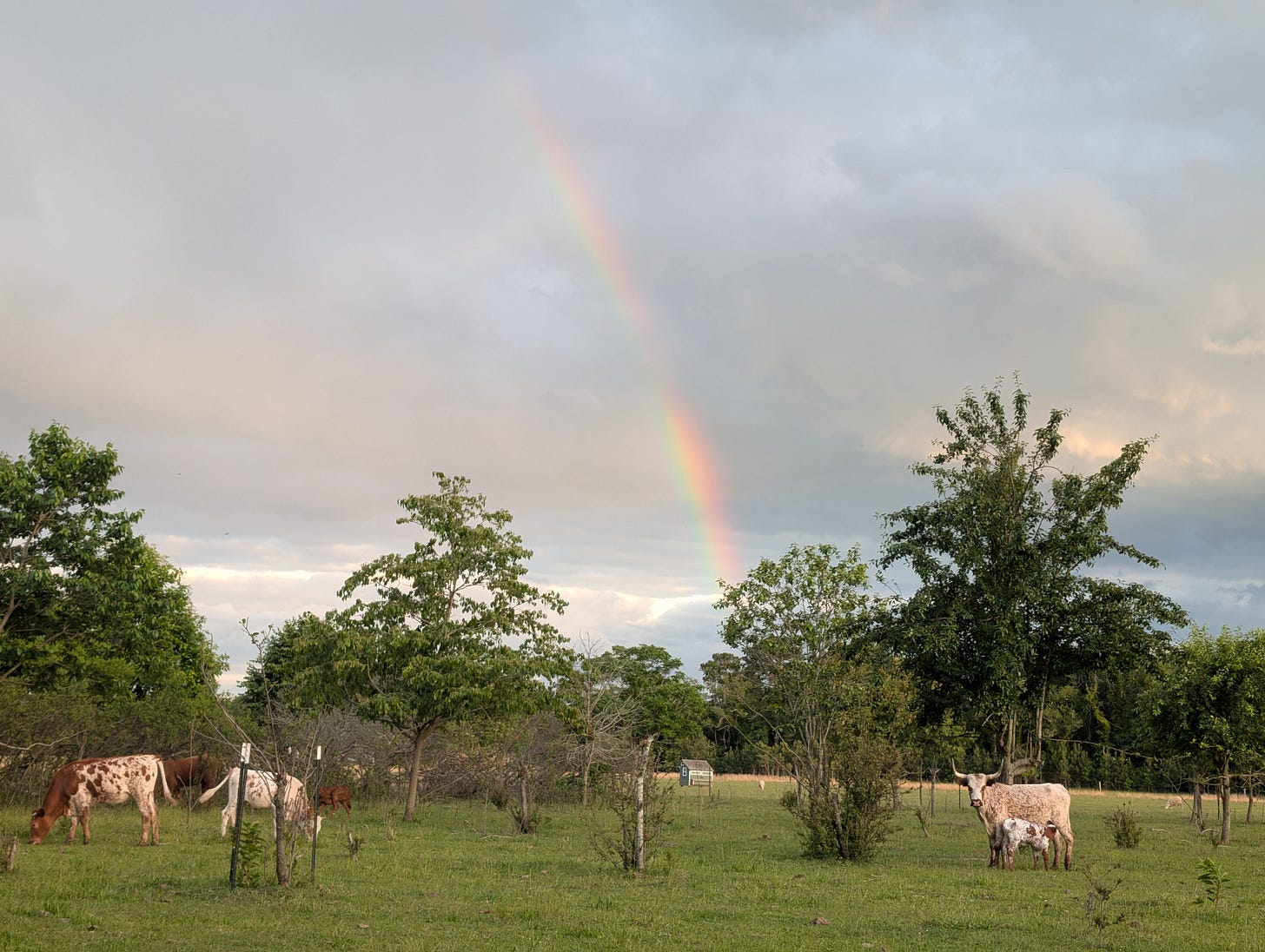
In biodynamics, experience is everything. It doesn’t matter how many gardening books you read if you never get dirt under your nails. No amount of reading about working out in a gym makes someone physically stronger, though studying techniques may be quite useful if actually implemented. Talking about wisdom does not make anyone wise. Similarly, there is no living anthroposophy by merely reading and talking about it.
If anything is not lived out in daily activity, information — even about biodynamics — is a kind of poison. Someone whose will is not strengthened to do more concrete good in the world becomes poisoned by wisdom that cannot be enacted due to spiritual weakness. People intoxicated by too many unenacted ideals easily become lost in opium clouds of high words and mistake imaginations for accomplishments. The more someone knows, the more culpable they are — even if they lack the power to do the good they understand with their heads.
Living knowledge is only acquired by doing the work. This isn’t to say everyone must garden or farm, but anyone who wishes to develop living knowledge of biodynamics certainly must garden or farm. This is where an organic hierarchy emerges: a hierarchy of experience. Assuming they have been paying attention and sifting experience for the gold flakes of their lessons, the more experience someone accumulates, the more experiential knowledge they will have acquired.
Not everyone older than us is wiser than us, but almost everyone wiser than us is older than us. As the sun illuminates the Earth, all energy flows from high concentration to low concentration. Like each of the biodynamic preparations, each of us has a different tincture of experience which can inform someone else with those qualities. Someone well-versed in repairing machinery can teach another, someone prolific in philosophy can educate another, and someone who has grown plants for years can initiate someone else into caring for the Earth.
By the end of a life, how many times will we really have grown tomatoes? A few dozen? How many times will we make biodynamic preparations (or even use them)? Another few dozen times? Who becomes an “expert” at such things? Even if you grow up on a farm with the best practices, you still only have a few dozen times to practice growing tomatoes well. The more anyone makes biodynamic preparations — or grows tomatoes — the more one realizes that every season is different and that the right answer to most questions is the unsatisfying reply: “It depends.”

Developing a sensitivity for the unfolding dynamics of plants or soil does not occur spontaneously or without a prolonged and intimate relationship with tending living beings. This goes against almost all of the prevailing prejudices of our time. We often have people in charge of regulating agriculture without any farming experience. Such dead “head” knowledge is driving our world towards a precipice. You cannot “think” your way into plants, because they are not products of dry logic, but living beings whose veins course with light. While life never contradicts logic in any real sense, life is far more than logic because it is imbued with the libidinous will to become, to grow, and reproduce.
Information without unifying spiritual ideals is denatured truth; it is the fast food of the soul.
What is dead knowledge? It is something memorized but not felt. It is like memorizing a biology textbook but not knowing how to keep a plant alive. Or having an enormous filing cabinet of article clippings about plants, but tending no houseplants. Or knowing hundreds of verses of scripture and doing nothing for the poor. Dead knowledge is anything that hardens in us that we do not feel is valuable enough to live into action.
We often imagine that listening to someone summarize information makes us knowledgeable by proxy. As Plato warned through the voice of Socrates that the written word would harm our ability to remember, electricity has accelerated how quickly information travels. We process information no better now. Eating faster does not mean digesting better. If anything, the speed-of-light conversations we can have with anyone virtually anywhere in the world encourage flippant reactions rather than deep, thoughtful replies in handwritten letters.
With an unprecedented diet of information, our souls suffer from indigestion. This was already true in Steiner’s time with the introduction of the telegraph, but it has progressed at breakneck speed through the telephone to the internet, smartphones, and now the frenzied pace of AI. Agitation and handwringing about things far away is not a meaningful concern put into practical action. Mere emotive affection, which often expects others to change their ways but itself does not do anything to benefit the object of concern, is of absolutely no virtue. You will know a tree by its fruit.
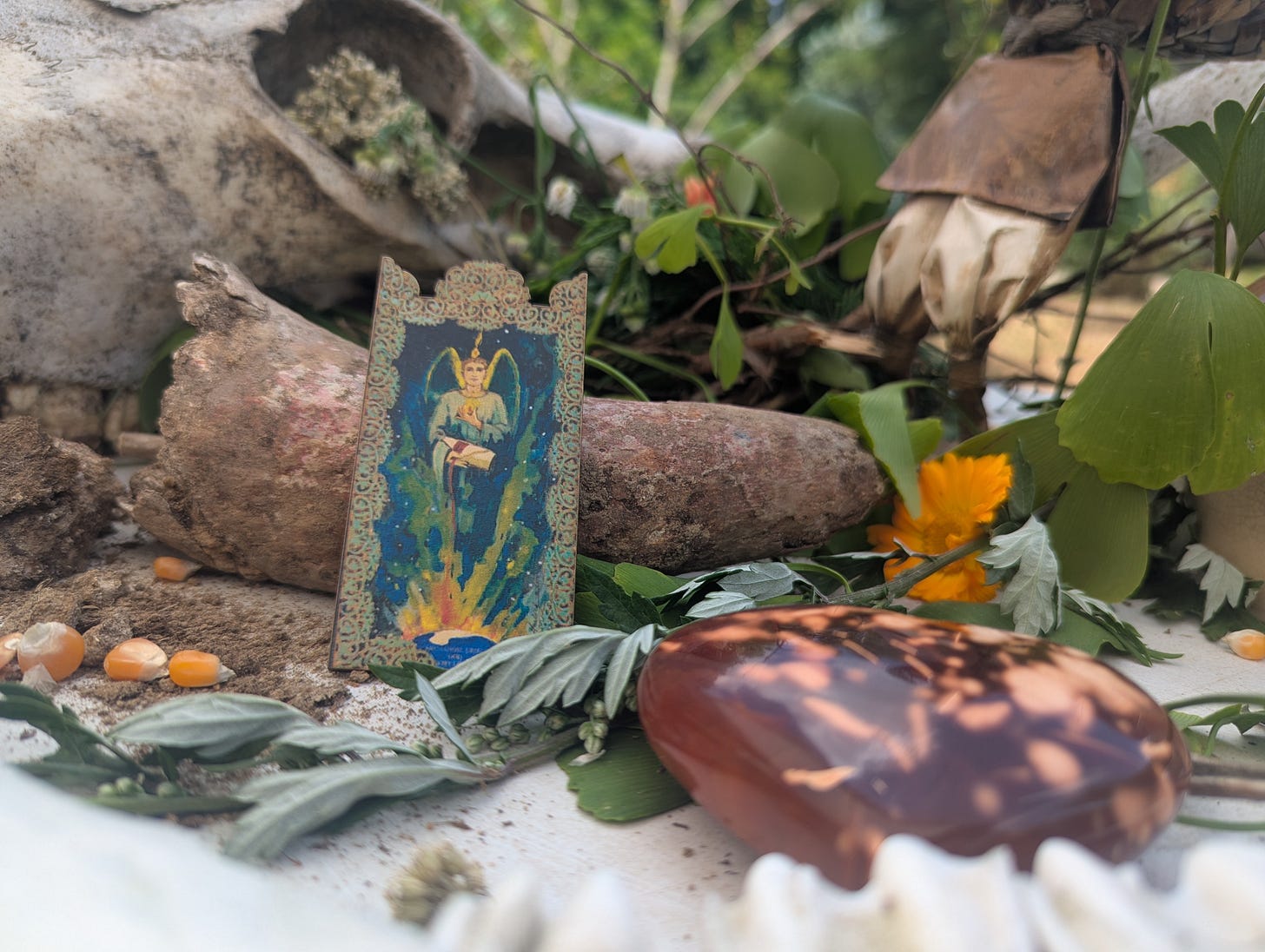
Last weekend, from June 12 -15th, folks from as far as Texas and New York gathered here at Perennial Roots Farm in Virginia with the express intention of making preparations for The Josephine Porter Institute. We gathered dandelions and collected nettles from plants that have been reseeding and reproducing here on our farm for well over a decade. We grow all of the biodynamic herbs here on our farm and are honored to donate them to make JPI preparations. At the heart of this nonprofit endeavor are the perpetual gifts from the elemental world and from the farmers and gardeners who support this work. These are preparations that will eventually make their way out across the world. JPI Board President, Teresa O’Shaughnessy, spent the week with us here on our farm, and accomplished all manner of tasks from leading us in an opening ceremony to blowing up deer bladders with colorful birthday balloons to picking and chopping nettles and collecting chamomile and yarrow in the midday heat and humidity.

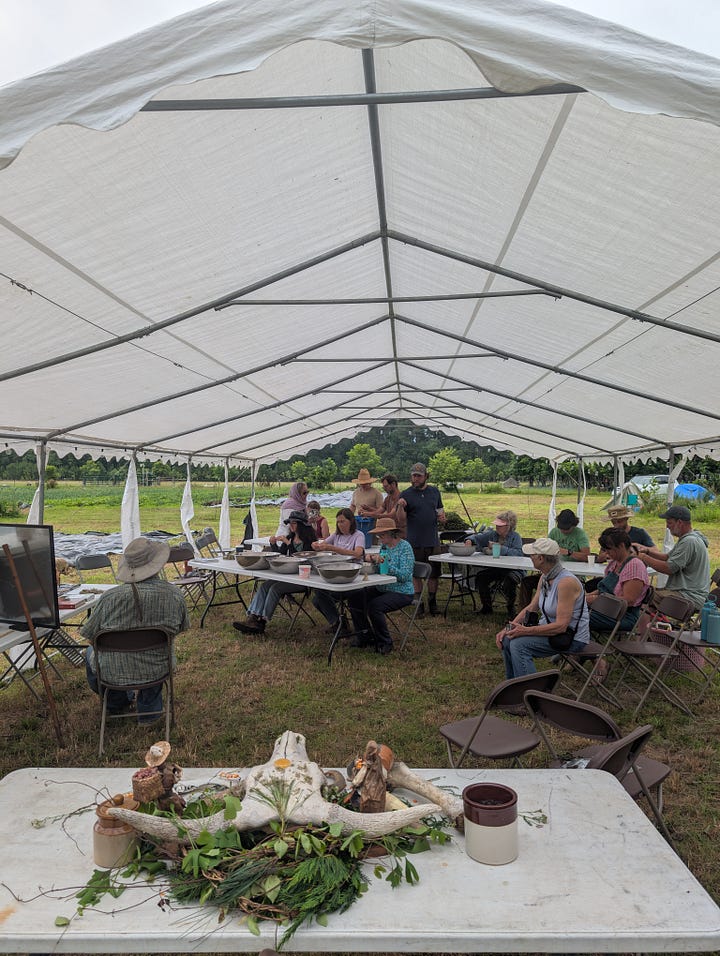
We should always remember that biodynamics begins with the hands. As Hugh Courtney liked to say, “Biodynamics is not an intellectual path, it is a path of the will.” One could say exactly this about anthroposophy: it is not meant to be a cerebral path of bloated head-knowledge or parroting the right vocabulary, but about implementing spiritual ideas in action. This is difficult. We are troubled by a phenomenon C.S. Lewis calls “men without chests” — viz., humans without hearts. Ehrenfried Pfeiffer reports Steiner speaking of the exact same problem: “Nutrition as it is to-day does not supply the strength necessary for manifesting the spirit in physical life. A bridge can no longer be built from thinking to will and action.” Listen to this carefully: a bridge can no longer easily be made from head to hand because the heart is too weak. We can believe one thing and live in a way that completely contradicts our beliefs, only because our commitment to our ideals is so lukewarm.
To put it another way, our felt devotion to our spiritual ideals is too weak to motivate us to work selflessly in the service of others. It is as if our brains have become huge granaries full of ideas — but without the compost of experience in our fields to help those seeds grow, these seeds are useless. The living bridge between the physical and the spiritual must be regrown with experience.
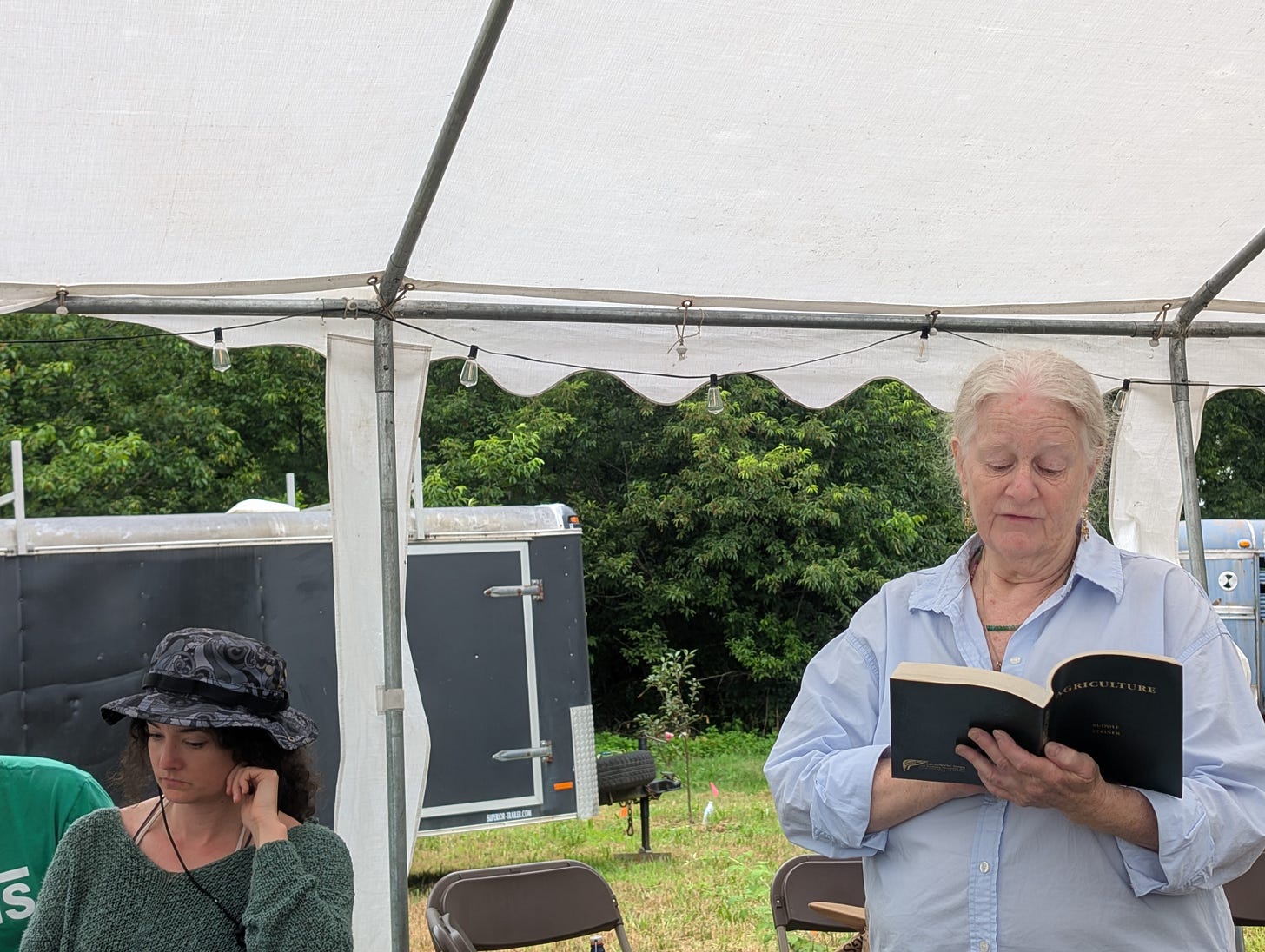
Nutrition must consider everything that enters an organism (or leaves it) in any way. Seeing, hearing, smelling, tasting, thinking, feeling, wishing — all of our experiences are forms of nourishment. If something cannot be digested properly, it becomes a poison. Even drinking too much water is toxic!
Talking is essential for communication, but if we never stop talking, we easily squander all our energy without accomplishing anything. The same goes for following the news too obsessively. A steady stream of disconnected factoids (“in other news…”) without unifying spiritual ideals only gives denatured truth. Information without participatory knowledge is as nourishing as ash in the mouth. Information is the fast food of the soul. No quantity of junk food will make up for its lack of quality. We have to turn to real nourishment for health.
Aldous Huxley warned about this decades ago: “Listening four or five times a day to newscasters and commentators, reading the morning papers and all the weeklies and monthlies nowadays, this is described as ‘taking an intelligent interest in politics.’ St. John of the Cross would have called it indulgence in idle curiosity and the cultivation of disquietude for disquietude’s sake.”1 Similarly, Steiner says in Knowledge of Higher Worlds, “All curiosity must fall away from the student. He must rid himself as much as possible of the habit of asking questions merely for the sake of gratifying a selfish thirst for knowledge. He must only ask when knowledge can serve to perfect his own being in the service of evolution. Nevertheless, his delight in knowledge and his devotion to it should in no way be hampered.”2 We should never cease our pursuit of knowledge, but we must be selectively ignorant of what is not essential, plugging our ears to the sirens of agitation. Knowledge — the venom of the serpent — must always be oriented towards service. This is seen in the rod of Asclepius, where the serpent’s venom is put in the upright service of life. The dose is the poison.
Nutrition as it is to-day does not supply the strength necessary for manifesting the spirit in physical life.
For each step of esoteric (or intellectual) development we take, we must take three steps in expanding the heart. This means we must work harder at seeing our true self, not in my own physical comfort or discomfort, and not in how things affect me, but rather in the faces of others. “The world is a mirror wherein every man may see his own face.”3 What we most perceive in others says more about ourselves than about others. For example, a guilty conscience is suspicious of everyone else’s ulterior motives. To “weep with those who weep and rejoice with those who rejoice” requires, as a prerequisite, identifying with how others feel more than with how my “me” feels.
When our center of gravity is not centered in “me” but rather in the light we elicit from others, the heart opens. The heart is the nexus of sensitivity for beauty in living forms and harmony in social situations. The instinct for what is good is the “preparation of the heart”4 for the reception of truth. If we do not begin by first seeking out what is good in something, we will certainly never find it by criticizing its shadow — at most, criticism will find what is useful to me, but not what is good in itself or how I can help it.
Dangerous animals (and people) are quite honest about the threat they pose. Ostentatiousness warns others of a cold heart. Someone who brazenly violates relative social etiquette (or does not consider it at all) is unlikely to make a good coworker because they are either insensitive (caring only for “me”) or, worse, are sadists (enjoying causing discomfort for others). An insensitive person is a dull person. “Just as I, as a man, can pass unnoticed before some dull fellow, so can everything in the soil and above it pass unnoticed before a dull plant.”5 When working alongside others, someone who feels little value for social harmony is brazen and violent while remaining insensitive to the harm he causes. “Lay the cause of infidelity where you will, it is a certain truth, that it lies only in this insensibility of the heart.”6
To listen to a voice that is not my own, I have to set myself aside. I don’t go anywhere else, but to hear the “We” beyond my “me,” I must quiet myself first. Listening to a voice that is not my own is not entering a space where opinion is pitted constantly against rival opinion, preventing any unity except that of perpetual disunity; nor is this “We” a totalizing collectivism, where individual expression is lost in some beige uniformity, but a greater whole made up of smaller wholes. Any amalgamation of various fragments remains fragmentary, and any identity that erases individuality is illusory.
Perception asks: How can I help you?
A healthy sense of social responsibility is an aesthetic (heart) function. What we’re really talking about is recovering an aesthetic sensibility — an artistic appreciation of beautiful harmony in all its forms. This is not about external superficial seemliness but rather the beauty of the soul. Alex Podolinsky actually warns us against people who are too attractive — they have invested all their forces into perfecting their physical nature, not their moral nature.7
If interpersonal disharmony does not cause us suffering, how can any of us ever love our neighbors as ourselves? Without a sense of moral beauty, we cannot function together in any way more than children squabbling in a playground. Any social group that practices recognising the reflected light in others’ faces as our truer self (rather than how others affect me) will never look blandly uniform, but will set aside unnecessary disagreements. A dynamic, living, emergent sensitivity is not rigidly fixed but rather is something flowing — if the face of a river did not continuously change, it would be dead.
Contemplative Chromatography
“[T]heosophy does not have an iconography—itself a science of images… theosophy uses images designed to reveal the transcendence of images.” - Arthur Versluis, Wisdom’s Children
As soon as I criticize a phenomenon, I am no longer present with it. This is why I avoid interpreting chromatograms in class settings. If I give you my opinion, I place my opinion between you and the phenomenon itself. Instead, it is important to look and look again, seeking out anything we might have missed, and then looking closer again. When the image has totally filled our imagination and evoked a kind of objective mood, then and only then is it safe to analyze. Only when we have become what we are looking at can we appreciate its qualities. As the alchemical maxim says, Lege, lege, et relege! — read, read, and reread [the Book of Nature]!
Criticism immediately kicks us out of participation, while Goethean observation shuns disagreement for the sake of openness to the phenomenon in front of us. If someone begins an event imagining ways it should have been better, they will not really be present for any of it. When we criticize, we remain “outside” what we criticize. But to know something truly — including any other person — one must love it. ‘All reasoning and speculation stand on the outside of the heart.”8
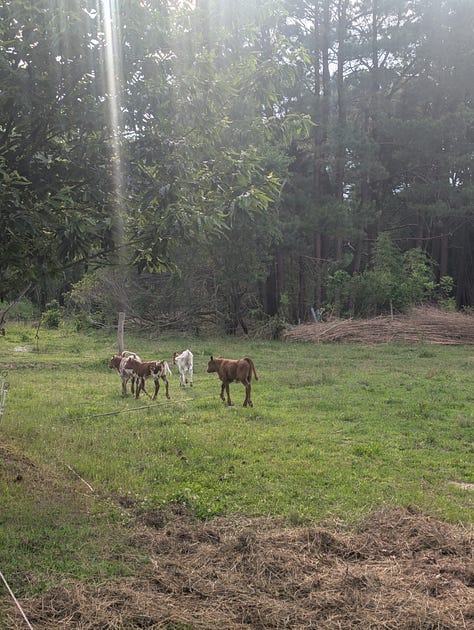

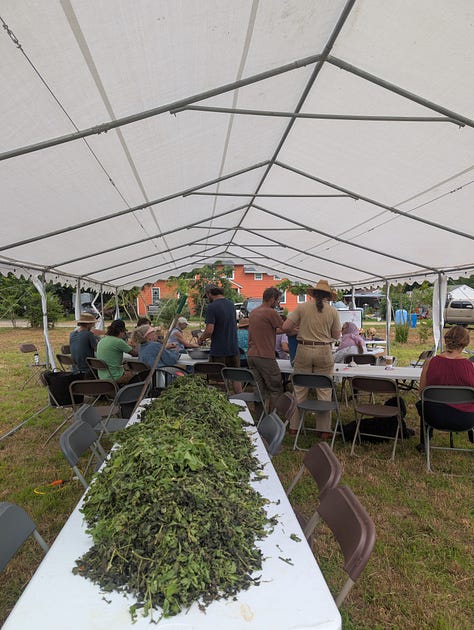
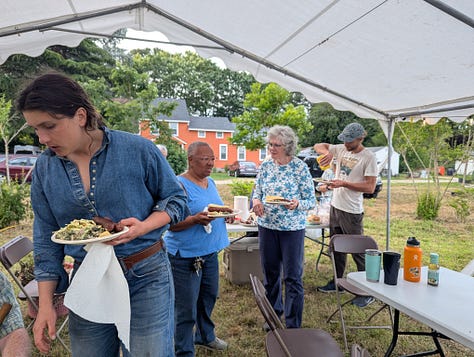
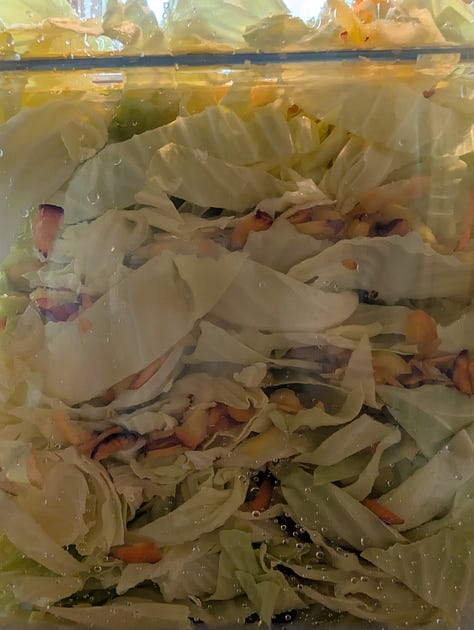
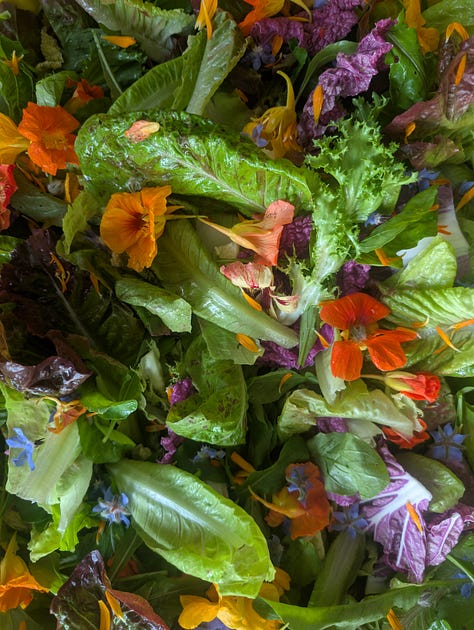
Alan Chadwick says, “Don’t ever go into the garden because you want something, because that is what you will get and that will be very sad.”9 Analysis is the death of perception — it walls us up, closes us up. And if all we do is analyze or criticize, all we can ever do is agree to disagree in a war of all against all. As soon as I ask, “Is this plant good or bad?” I’m no longer looking at the plant, but instead focusing on what I want out of it. Just look. Analysis asks: How is this useful for me? Perception asks: How can I help you?
As the artist René Magritte writes, “It is a GREAT MISTAKE to believe that, in order to be perfect, the house must have an additional aim: to trigger aesthetic sensations automatically in the inhabitant or the passer-by.”10 A plant does not do anything unnecessary - everything is functional, and beautiful inasmuch as it conforms to that holistic functionality. As a plant is an external visible expression of the invisible potential life energies in the soil, so living form follows function. A flower looks the way it does because the plant desires something, and the form unfolds consequentially.
There is often more beauty in an old barn that has been repaired lovingly with mismatched materials (and varying levels of skill) than in an immaculately uniform barn that is no longer on a working farm. Similarly, no amount of anthroposophical paraphernalia makes a gathering anthroposophical. No amount of external conformity gives an essential connection. A sensible anthroposophical farmer — not necessarily a contradiction! — would continue “using his old machine until it was no longer of any use.”11 An old tractor may not appear particularly anthroposophical, but a farmer who maintains his equipment without going “machine mad” has more in common with anthroposophy than all the right infrastructure in the world. In fact, the more the context appears visibly spiritual, the more guilt one has for not living up to it. Form without substance is what Jesus called white-washed tombs. This is why form must always follow function. William Law writes, “The natural love or affection of relations, bears no proportion to our rational abilities to speak or write of them.”12 Refined appearances without a living spirit devoted to enacting those ideals are deadening.
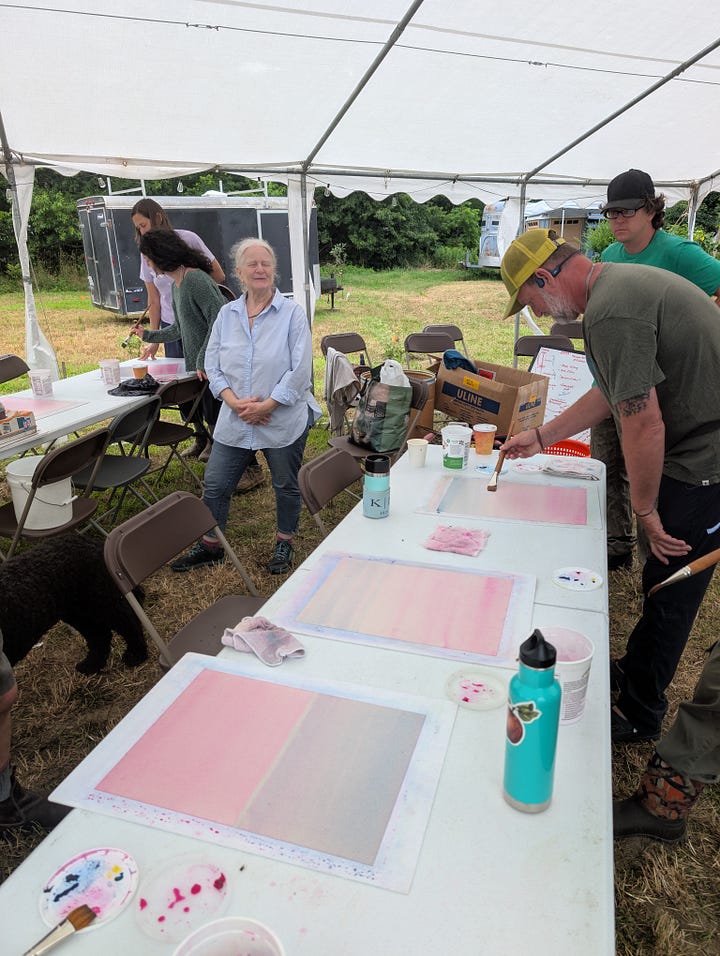
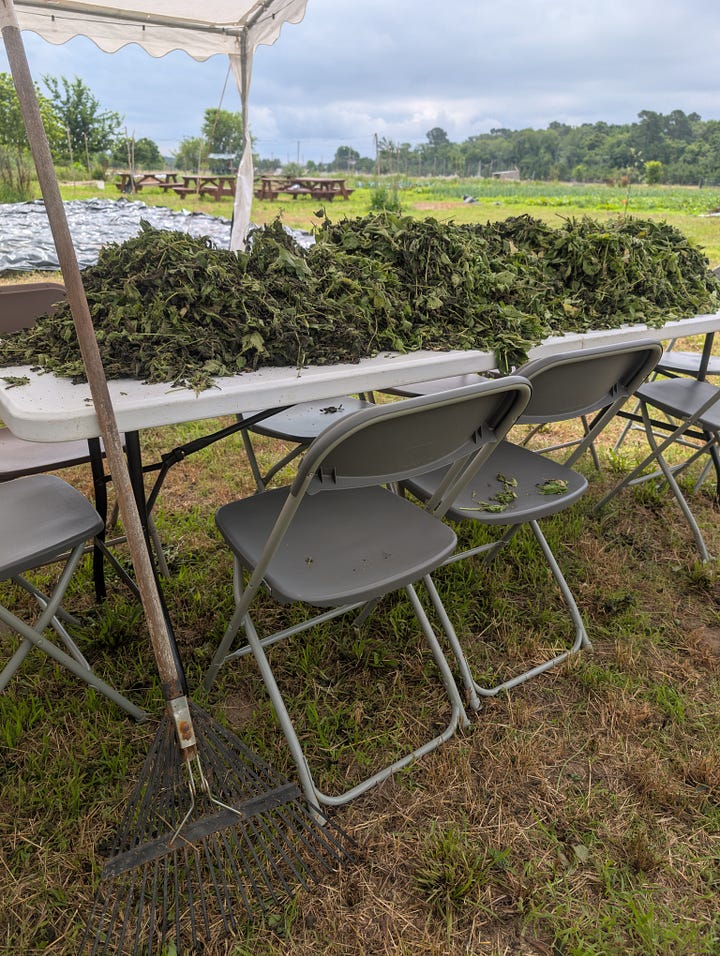


At our recent workshop, the inestimable Michael Judge spoke about the evolutionary importance of overcoming instinct, compulsion, and lust in the process of human development, all while we stuffed bladders with yarrow and made preparations for The Josephine Porter Institute. “The trial of our epoch is that of Faust. It is the trial of the satisfaction of desires.”13 We must replace sensual desire with aesthetic appreciation.
For example, the amount of discomfort growing tomatoes is not “less” than the total sweetness of the yielded tomato, but the aesthetic appreciation of a beautiful homegrown beefsteak tomato is worth more than the amount of sugars. Growing tomatoes takes more calories than they give us, but merely a bigger quantity of calories is not the goal. The point is spiritualizing matter. Anyone striving for something more understands that personal comfort is not an aim in itself, but something to give away for the sake of the good, beautiful, and true.
Ehrenfried Pfeiffer writes, “The born farmer, with his innate love for the soil and his especial soul forces connected therewith and also with his professional and traditional background, is able to follow his calling in a way that […] suburban dwellers can mostly experience only after very long practice. The first essential thing is to awaken in them a feeling for the forces of growth, for the eternally creative forces of Nature.”14 As food can be overprocessed and sealed up in little compartments, so too can human beings.
From Hand to Heart to Head
“Certain thoughts are practically unthinkable except in terms of an appropriate language and within the framework of an appropriate system of classification. Where these necessary instruments do not exist, the thoughts in question are not expressed and not even conceived.”
The first essential thing is to awaken in them a feeling for the forces of growth, for the eternally creative forces of Nature.
Also at our workshop, our friend Martha Loving honored us with a group exercise painting magenta — that rich maternal color. Each team took turns making brush strokes gently on the page, striving to eliminate any hard lines. One paints, then the other paints, and what emerges is something that tells you how the two of you relate. Natalie and I painted together. After fifteen years farming together, this is what our “We” looks like:

We don’t read the same books. We don’t have many of the same interests (beyond farming) and remain distinct individuals — and yet, we sacrifice this point or that point for the sake of a more harmonious collaboration. Farming (and marriage) is like a rock tumbler. With enough patience (and goodwill), the rough edges of both partners are removed and polished, and the two can work together as one without ever losing their distinct qualities.
Spiritual children ask how the world can benefit them. Spiritual adults ask how they can benefit the world. The question for us today is: how can I help? If everyone asked how they could help as their first approach to problems and thought nothing of the sacrifice it brings, this would be a scalable and ethical way of living that would truly bring peace on earth. Each individual act may seem small, but if we each were willing to listen to a voice that is not ‘mine’ and put ourselves in service of the other, biodynamics would be the treasure of the entire world.
Karl König says, “I don’t think we should keep animals in order to have food; we should keep animals in order to be near the wellsprings of all existence and creation.”15 This might sound preposterous to someone who opposes all exploitation of animals, but how many tend animals, feed them, give them water, and protect them every day? We find ourselves wishing that we could just keep cows and never have any of them die. But without death, a herd overgrows its limit, and then the entire herd suffers and perishes. As Goethe says about Nature, “Life is her most exquisite invention; and death is her expert contrivance to get plenty of life.”16 Per Spiritum Sanctum Revivisimus.
This is what we must continually ask ourselves: How can I serve the wellsprings of existence? How can I remain open to the ever-unfolding splendor of life?
This is what “We” looks like.
Aldous Huxley, Perennial Philosophy, pg. 121.
Rudolf Steiner, Knowledge of Higher Worlds, pg. 102.
Franz Hartmann, Magic: White and Black, pg. 160
William Law, Complete Works, pg. 1283
R. Steiner, Agriculture Course, Lecture V (GA327, 13 June 1924, Koberwitz)
William Law, Complete Works, 1283
If you doubt this, consider the habits of actors and celebrities.
William Law, pg 1277.
Alan Chadwick, Performance in the Garden, pg. 133.
Rene Magritte, Selected Writings
R. Steiner, Agriculture Course, Lecture IV (GA327, 12 June 1924, Koberwitz)
William Law, Complete Works, pg. 1276.
V. Tomberg, Meditations on the Tarot, pg. 643.
Ehrenfried Pfeiffer, Biodynamic Journal, Summer 1941, Vol. I, No. 1/2, pg. 3
Karl Koenig, Earth and Man
T.H. Huxley, in Norman Lockyer (ed.), 'Nature: Aphorisms by Goethe', Nature (1870), 1, 9










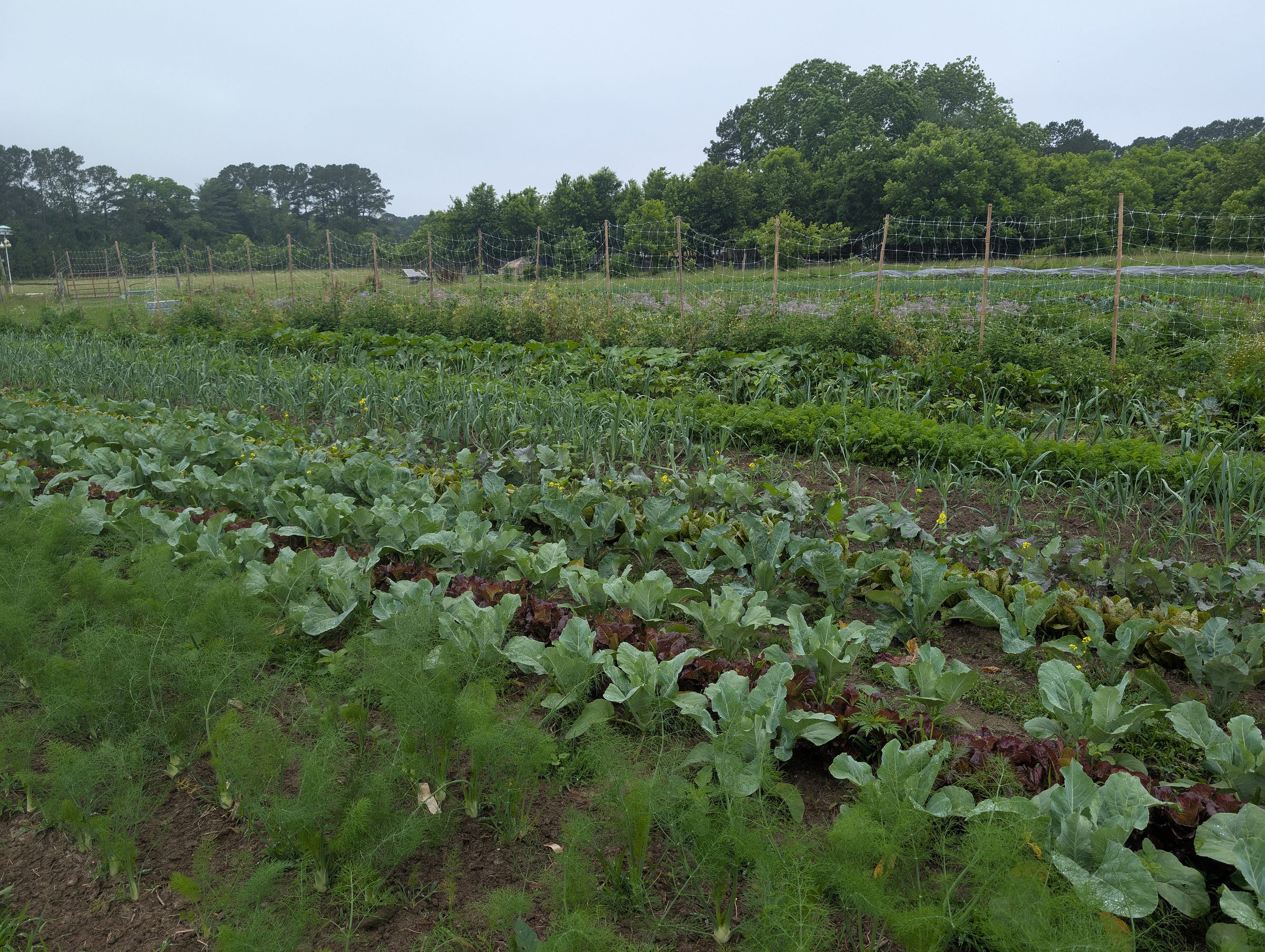

What a timely essay for a world that consumes information and soundbites like an unsupervised child binging on Halloween candy. I eliminated television from my life decades ago but fairly recently found myself examining how many of the newsletters, substacks, informative emails I receive are essential to my navigating my place in the world in the way i would like. . Part of that is noticing how each affects me in the reading of it, what it stirs up in me if anything, asking "does it agitate" as you say, or "does it motivate". Unfortunately most of it does the former.
Your writing is different from most. it can't be swallowed whole but needs to be chewed on, contemplated, digested slowly.
Thank you for the time and effort you put into your writing.